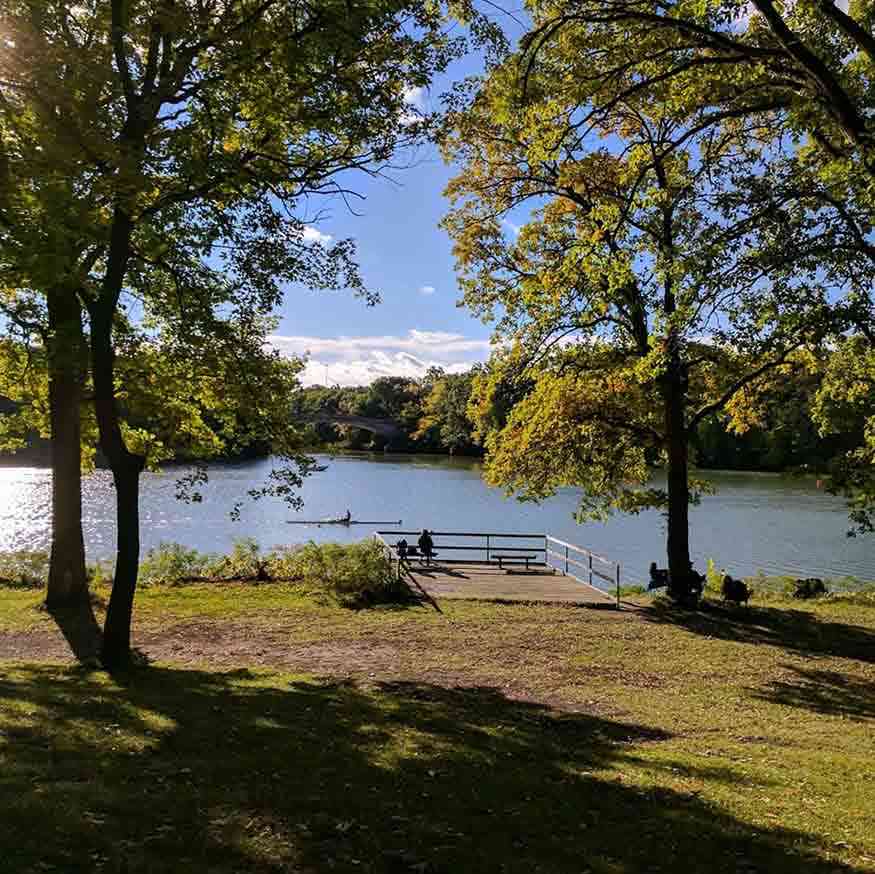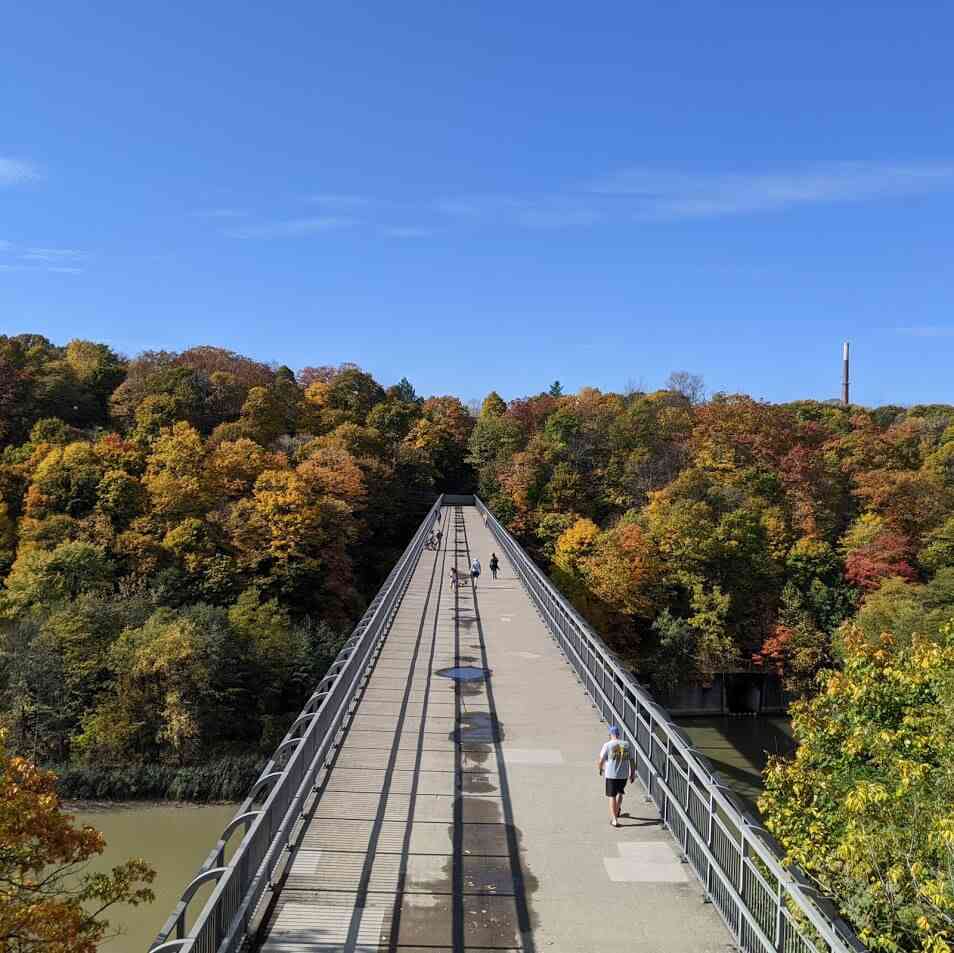Rochester, New York, is home to several parks designed by Frederick Law Olmsted, known for their beauty, accessibility, and historical significance.
Many consider Olmsted the father of American landscape architecture. He designed parks and public spaces throughout the United States in the late 19th and early 20th centuries, including NYC’s Central Park, Niagara Falls State Park, and the grounds of the U.S. Capitol in Washington, D.C. In Rochester, Olmsted and his partner, Calvert Vaux, designed four significant parks: Highland, Genesee Valley, Seneca, and Maplewood.
Highland Park is a renowned Olmsted park in Rochester, known for its stunning design since its creation in 1888. The park is home to the annual Lilac Festival, which takes place every May and attracts visitors from all over the world. In addition to this, Highland Park features a conservatory, a sunken garden, several memorials, and well-maintained paved walking paths for visitors to enjoy.
The Genesee Riverway Trail is a pathway that connects three of the Olmstead-designed parks—Genesee Valley, Maplewood, and Seneca—providing miles of cycling, jogging, and walking opportunities.
Rochester’s Olmsted parks not only offer enjoyment and beauty but also hold significant historical value. During a time of rapid urbanization in the United States, when cities were facing issues such as overpopulation, pollution, and inadequate access to green spaces, Olmsted designed these spaces for people to seek fresh air. He firmly believed that public parks were essential for promoting physical and mental health and social harmony, and he invested his efforts in realizing his vision. Today, Rochester’s Olmsted-designed parks are vital community resources and serve as a reminder of the importance of green spaces in urban areas.
On April 26th, we celebrate the birthday of Frederick Law Olmsted, Sr., and the gift of green spaces that he left in our care. The city of Rochester’s website states that “Rochester is fortunate to be one of a handful of American cities with a park system designed by the most revered landscape architect in American history.” Fortunate indeed!
To properly celebrate Frederick Law Olmsted’s life, we must recognize the Rochester Park Commission that hired him in 1888. Edward Mott Moore, the Father of Rochester’s Park System, has a statue in Genesee Valley Park. Olmsted’s park-as-arboretum design philosophy inspired Bernard Slavin’s landscape design of Durand Eastman Park.
Rochester’s Frederick Law Olmsted-Designed Parks

Genesee Valley Park
It was initially named South Park.
The Erie Canal ran through downtown Rochester between 1888 and 1893, when GVP was designed by Frederick Law Olmsted Sr. His son, John C. Olmsted, designed the beautiful stone bridges that we can still enjoy today in 1918. Olmsted Sr.’s Sheep Meadow was turned into a golf course in 1899, which became one of the first public golf courses in the nation.

Seneca Park and Maplewood Park
It was initially named North Park: Seneca East & Seneca West.
Along with Seneca and Maplewood Parks, Frederick Law Olmsted designed Seneca Parkway—which features a park-like mall—to connect them. These developments occurred in 1888, following the establishment of the Driving Park Race in 1875. Although Olmsted’s original 1888 design included a rose garden, the Greater Rochester Rose Society formally dedicated it in 1951 and has since been responsible for its maintenance and care.

Highland Park
Olmsted was initially not keen on designing Highland Park due to the lack of natural water elements that were typical of his landscapes. However, the parks department made it a requirement for the job they were offering, so he reluctantly accepted the assignment.
We owe our gratitude to Ellwanger & Barry for generously donating the land, trees, and bushes grown at their renowned nursery located on Mount Hope Avenue. They were also notable contributors to the construction of the Children’s Pavillion, which was unfortunately demolished in 1963. The Highland Park Conservancy has announced its plans to rebuild the pavilion, and the construction work is expected to begin in 2024.
The University of Rochester Arboretum
Frederick Law Olmsted, Sr. designed the “River Walk” of oak trees along the Genesee River for the University of Rochester. An article about the University’s recognition as a top tree campus states that there are more than 1,400 trees of 116 different species in the arboretum and grounds. These include the trees and shrubbery on the River Campus, Eastman School of Music campus, the Memorial Art Gallery, the Medical Center campus, and the Mt. Hope campus.
Parks Designed by the Olmsted Firm
Between 1889 and 1895, Frederick Law Olmsted completed his final landscape design project at the Biltmore Estate in Asheville, NC, shortly after finishing Rochester’s park system. The Olmsted firm completed 25 additional projects in Rochester, which included designing squares and parts of Cobb’s Hill Reservoir.

Squares
- Susan B Anthony Square was initially named Madison Square.
- Washington Square
- Brown Square
- Jones Square
- Lundsford Circle was initially named Plymouth Park.
- Schiller Park was initially named Franklin Square.

Cobb’s Hill Reservoir
The Olmsted firm designed the walkways, iron fences, steps, and overlooks surrounding the reservoir, recommending unobstructed views of the city.
Learn More About Frederick Law Olmsted-Designed Parks Around Rochester
Videos
- Olmsted and America’s Parks video
- Frederick Law Olmsted, Designing America video series
- Designing Western New York video
Rochester Parks System – Highland Park Conservancy
According to the website, “Rochester is one of just four cities nationwide that boasts an entire park system designed by Frederick Law Olmsted, the father of the landscape architecture profession. Olmsted designed Highland, Genesee Valley and Seneca Parks for Rochester. Olmsted and the firm that continued his work after his retirement also designed several parkways and small neighborhood parks.”
National Association for Olmsted Parks
According to the website, “In 1865, Olmsted returned to New York to join Vaux in completing their work on Central Park and designing Prospect Park in Brooklyn. Over the next thirty years, ending with his retirement in 1895, Olmsted created examples of the many kinds of designs by which the profession of landscape architecture (a term he and Vaux first used) could improve the quality of life in America.”
125 Years of Rochester’s Parks
According to the website, “Just a few years into the vast project of establishing the park system, the park commissioners reported that ‘our citizens have come to have a strong personal and civic pride in our public pleasure grounds. Nothing possessed by the municipality is so especially owned and occupied by the people as the parks.'”
A Town Square
According to the website, “Here in Rochester, two of Burnham’s colleagues, Arnold Brunner and Frederick Law Olmsted the younger, authored ‘A City Plan for Rochester‘ in 1911. Sponsored by the Rochester Civic Improvement Committee, the plan is squarely situated in the City Beautiful Movement begun by Burnham.”
The Legacy of Frederick Law Olmsted
According to the website, “Olmsted felt that the river was the city’s most valuable natural asset and needed to both preserved and celebrated.”
If you use Google Maps on your mobile device, add this map as a layer.
Explore More
These carefully designed gardens, often cultivated for decades or even centuries, display exceptional collections of flowers and trees.
At Genesee Valley Park, the river merges with the Erie Canal and continues north through Rochester before reaching Lake Ontario.
Guided Walks and Tours Around Rochester, NY
Local experts who highlight the rich history, geology, ecology, and community of the greater Rochester region lead these guided walks.
Monroe County parks are free and offer 12,000 acres of natural, zoological, horticultural, historical, and geological experiences.
The Flower City: Exploring Rochester’s Extraordinary Flowers and Trees
Rochester became a global center for flower and tree nurseries in the mid-1800s, fostering our identity as The Flower City.
Beyond the gorge trails, nature centers, and gardens, these exceptional parks offer unique experiences and amenities worthy of exploration.
H2O Heritage: Exploring Rochester’s Freshwater Resources
Rochesterians are fortunate to be surrounded by abundant freshwater resources that present us with unique stewardship opportunities.
Land That I Love: Your Guide to Roaming the Earth Around Rochester
Enjoy the beauty and wonders of the world by making the most of the varied memorable experiences offered by our parks, gardens, and farms.
Which are your favorite Frederick Law Olmsted-designed parks?
Your insights and experiences are valuable. Please share them in the comments.

People often ask me if I get free access to places while exploring. The answer is no unless I’m invited to previews or granted behind-the-scenes access as part of my media role. Generally, I don’t mention my project, Day Trips Around Rochester, NY, because I want the same experience you would have. I create and share content simply because it brings me joy. I would appreciate your support—a cup of coffee or two to help fuel future field trips—if you have found valuable information here that has helped you explore the Rochester area.








We are BLESSED to have so many beautiful parks in our area.